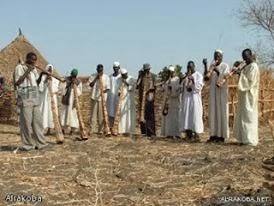Sudan’s defence minister vows decisive summer for Darfur rebels
April 11, 2014 (KHARTOUM) – Sudanese defence minister Abdel-Rahim Mohamed Hussein has called on rebel groups in Darfur to seek a negotiated peaceful solution, warning that a summer military campaign would crush rebellion in the restive region.
Hussein, who addressed a public meeting with the Rapid Support Forces (RSF) in North Darfur capital El-Fasher on Friday, said the government welcomes rebel groups who wish to join the peace process, adding the government made the necessary arrangements to end rebellion in the region.
“Rebels have to join peace before they be militarily crushed,” he said.
He further praised the RSF militias, saying they set a good humanitarian example in dealing with hostages and citizens, and provided services for the needy population in the region.
The director of the National Intelligence and Security Services (NISS), Mohamed Atta, for his part, disclosed they had dispatched other RSF units to South Kordofan state to fight against the SPLM-N rebels and maintain security in the state.
The SRF militia, which operates under the command of NISS, is formed August last year to fight rebel groups in Darfur region, South Kordofan, and Blue Nile states following joint attacks by Sudanese Revolutionary Front (SRF) rebels in North and South Kordofan in April 2013.
NISS ACCUSED OF PLOTTING
Meanwhile Sudanese rebel alliance, the Sudan Revolutionary Forces (SRF), announced in a statement issued by its top military commander, Abdel-Aziz Al-Hilu, that they had obtained “certain information” that the NISS is undertaking a plan in coordination with the military intelligence, the Popular Defence Forces (PDF), aiming to mobilise tribal militias to fight against its forces in Blue Nile, Nuba Mountains, North Kordofan and Darfur.
He added that those militias, which include forces recruited from outside Sudan, will target civilians to displace them from rebel areas. But, the government will cover these attacks, describing it as tribal clashes.
The statement added this task was assigned to a force stationed in Al-Fayed village in Rashad district in the Nuba Mountains, pointing the force is commanded by Brig. Gen. Abdel-Samad Babiker, Lt. Col. Mohamed Al-Fatih Ahmed, and Maj. Gen. Mohamed Al-Rabie’.
The force is also supported by a battalion of Mujahideen (holy fighters) from Khartoum and a battalion of the paramilitary PDF, according to the statement.
The rebels said the militias backed by aerial bombardment, shelled Toumi and Al-Mansour areas in South Kordofan and burned several villages, including Toumi, Al-Mansoura, Tarawa, Kluro, Tendimen, Taglbo and Teri, in order to force villagers to move to government-controlled areas.
Al-Hilu called upon rights groups and human rights activists to condemn the scorched earth policy carried out by the government and expose regime’s repressive policies against defenceless citizens.
The commander of the RSF, Mohamed Hamdan Daglo, for his part, denied that his force had committed war crimes or human rights abuses in the region, accusing rebel groups of seeking to tarnish their image.
He said the RSF is innocent of these criminal practices, underscoring they arrested groups of outlaws who attacked civilians north of the town of Mellit while they were chasing remnants of the rebel Sudan Liberation Movement-Minni Minnawi (SLM-MM) following an attack on the town last month.
In March, the African Union and United Nations joint special representative and joint chief mediator for Darfur, Mohamed Ibn Chambas, openly accused the RDF of attacking civilians.
In his address at the Um Jaras peace Chambas condemned the RSF attacks, saying they were the main cause of displacement of thousands of villagers.
The SLM-MM carried out attacks in South and North Darfur states, triggering reprisal attacks by government militias on villages suspected of support to the rebels. These attacks coincided with tribal clashes in the North Darfur state.
The violence displaced over 215,000 civilians in the state.
(ST)






,+leader+of+the+opposition+alliance,+talks+to+reporters+with+other+opposition+leaders+on+12+June+2012+(ST).jpg)

